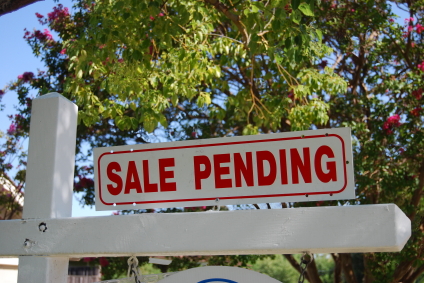What Does Sale Pending Mean in Real Estate?
“Sale pending” generally means that all contingencies have been removed and that the buyer is moving toward closing. But that doesn’t mean it’s necessarily a done deal. Here’s what you need to know to decide if a sale pending home is worth pursuing.
How typical real estate transactions work
To understand what “sale pending” means, it helps to understand how typical real estate transactions work.
A buyer generally makes an offer “subject to” a property inspection, a bank appraisal or full loan approval. Sometimes they make it “contingent upon” the sale of their current home.
If the buyers can’t get financing, sell their current home, or resolve an issue from the inspection, they can exit the contract, subject to one of those terms.
You may be able to make a backup offer
In some places, real estate agents label a home with some contingency as “active with conditions” or “active continue to show.” This informs other buyers and agents that the seller will still entertain other offers.
During this period, the seller can’t enter into an agreement with another buyer. Even so, the sale isn’t a done deal.
For another buyer, there’s still an opportunity for a “backup” offer. If the first offer falls through, the seller can move straight to the backup. Otherwise, the seller has to go back on the market and in some ways start from scratch.
It’s the exception to the rule. But in some markets, buyers don’t sign a contract until after they’ve inspected and investigated. That means they only have a “verbal” agreement with the seller. It’s not a done deal until all parties have signed, and the home is still available until that happens. A backup offer will try to trump the first place offer during the days and weeks when the first buyer inspects, appraises and investigates.
A sale is pending once all contingencies are removed
A sale that’s truly pending is one in which the buyers have removed all contingencies. The buyer is “locked in” to buying the home. The final step is to move toward closing, which can take anywhere from a few days to a few weeks. Most agents won’t label a home “pending” until the sale is close to a done deal.
Though it’s not too likely, a buyer can still walk away after removing all contingencies. For example, on occasion, a buyer has an emergency and needs to exit the contract. But most likely, the buyer risks losing the earnest money deposit.
Check the property’s status
Has the buyer had the inspections? Did they go well? Were there any issues? Have your agent ask the listing agent these questions to understand where things stand. This will help you understand whether there’s a potential opportunity. It will also give the seller some leverage.
But let’s be clear on this: You shouldn’t get your hopes up if the home of your dreams shows “sale pending.” Instead, put the home on the back burner and follow the sale. In changing markets, buyers get cold feet, or banks’ lending standards get more rigid, causing deals to fall apart. Your agent should make your interests known, so that if a deal falls apart, you’ll be next in line.


